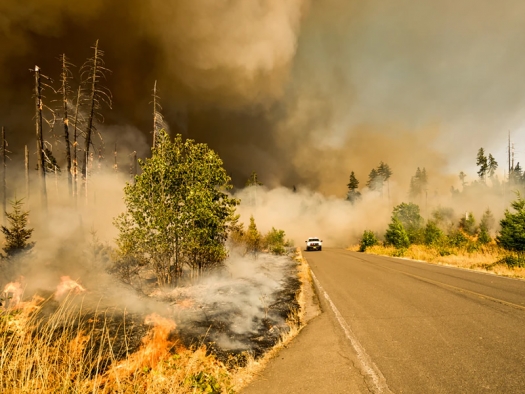Plus How to Best Protect Yourself
WildfireSmoke.jpg

Photo by Marcus Kauffman / Unsplash License
Every summer as the temperatures rise, wildfires make the headlines as they blaze across our country. As of July 31 2021, a whopping 37,650 wildfires have exploded across drought-stricken areas of the Western United States – engulfing a staggering 3 million acres of land.1 That’s nearly 1 million more acres scorched by wildfires in the first 7 months of this year than were consumed by these insatiable wildfires in previous years.
These raging fires aren’t only a threat to the wilderness and communities their flames engulf – but to all of us. As the smoke from these wildfires spreads they create hazy skies and prompt air-quality warnings across the country.
But just how much does exposure to wildfire smoke affect your health? As it turns out, smoke from these wildfires can have a serious and dangerous impact on your health – even if you live hundreds (or even thousands) of miles away from the flames.
So, what exactly is in wildfire smoke?
When a wildfire strikes, the blaze can engulf anything in its path – setting fire to trees, brush, crops, man-made structures, and anything else unlucky enough to be in the way. The smoke released by the burning of these materials contains a mixture of carbon monoxide, carbon dioxide, and particulate matter (also known as soot) that can contain a cocktail of chemicals such as:2,3,4
- Aldehydes
- Acid gases
- Sulfur dioxide
- Nitrogen oxides
- Polycyclic aromatic hydrocarbons (PAHs)
- Benzene
- Toluene
- Styrene
- Heavy metals
- Dioxins
These specks of particulate matter are measured in microns. Coarse particles range from 5 to 10 microns in diameter while fine particles measure 2.5 microns in diameter or less.5 For reference, 25,400 microns are equal to an inch – so it goes without saying that these particulates are entirely invisible to the naked eye.
These chemical-laden particulates become suspended in the air and can drift miles away from their source – making them particularly concerning when it comes to your health.
How exposure to smoke from fires effects your health
The microscopic particles produced by wildfires spread rapidly through the air potentially reaching people even thousands of miles away. As these fine particles float through the air, we inevitably inhale them. Coarser particles can deposit in your upper respiratory system, but the fine particles can bypass the defense mechanism of your upper respiratory system and penetrate deep into your lungs.
From there, these tiny particles can make their way into your bloodstream and travel throughout your body. Once in your bloodstream, these particles can set off your immune system – triggering a cascade of widespread inflammation and a range of symptoms ranging from mild to life-threatening.
Symptoms of wildfire smoke inhalation
Immediate and short-term symptoms of wildfire smoke inhalation include:6
- Throat irritation
- Wheezing
- Sneezing
- Coughing
- Runny nose
- Congestion
- Chest discomfort
- Eye irritation
- Shortness of breath
These tiny particles in the smoke can also cause more serious consequences for those with existing lung and heart conditions. Increased inflammation in the airways can cause a serious and life-threatening exacerbation in certain conditions resulting in acute respiratory distress.
Who is most vulnerable to wildfire smoke exposure?
While inhaling smoke from wildfires can be detrimental for everyone, there are some people who are at a higher risk of facing more serious side effects from exposure. Those who are at a higher risk of experiencing serious or prolonged side effects from wildfire smoke include:7,8
- Those who have an underlying respiratory condition like asthma, chronic obstructive pulmonary disease (COPD), or chronic bronchitis
- Individuals with an underlying cardiac condition like congestive heart failure (CHF), angina, or ischemic heart disease
- Those with a diagnosis of diabetes since this disease impairs your cardiovascular and immune function
- Pregnant women
- The very young and the elderly
- People who work outdoors and/or in close proximity to wildfires
But even if you don’t fall into a “high-risk” category, prolonged and/or repeated exposure to wildfire smoke can have serious consequences for your health.
Can wildfire smoke cause long-term effects?
It’s no surprise that the inhalation of these particles can cause an acute and immediate reaction. But can wildfire smoke cause long-term effects? The answer is yes.
Some of the long-term health consequences that have been linked to exposure to wildfire smoke include:9
- An increased susceptibility to viral and bacterial infections – especially respiratory infections
- In pregnant women, exposure can increase the risk of premature birth and/or low birth weights
- An increased risk of neurodegenerative diseases like dementia and Alzheimer’s
- A decrease in respiratory, cardiovascular, and neurological function in adults and children – although exposure has been found to be particularly detrimental to developing children
- Suppression of immune function and regulation
With serious and alarming effects like this, you’re probably wondering how exactly you can protect yourself from wildfire smoke.
How can I protect myself from wildfire smoke?
During wildfire season, it’s crucial to be proactive in protecting yourself from the ultra-polluted smoky air. Here’s what I recommend:
- Pay attention to the air quality ratings in your area to keep track of your risk
- Limit your outdoor activities and stay indoors as much as possible
- Keep your indoor air as clean as possible by keeping windows shut and closing the fresh air intake on your air conditioner to keep outdoor air from entering your home
- Keep your indoor air as clean as possible by avoiding burning candles, spraying aerosols, smoking indoors, or using toxic cleaners
When it comes to wildfire season, it’s more important than ever to protect the quality of the air you’re breathing on a regular basis. That’s because closing your home and staying indoors helps protect you from the toxins floating around in outdoor air, but it also increases your exposure to indoor air pollution.
You see, our homes and offices can be a toxic stew of airborne chemicals and pollutants. Thanks to off-gassing from synthetic material in our homes, dangerous chemicals in cleaning products, and lack of air circulation, our indoor air can oftentimes be chock-full of harmful toxins – making an air purification system an absolute must.
What is the best air purifier for wildfire smoke?
I strongly recommend investing in a high-quality air purifier for your home not only during fire season but year-round. When it comes to air purification systems, you’ll want to look for one that has a high-efficiency particulate air filter – also known as a HEPA filter.
But not all HEPA filters and air purification systems are created equally. The only two air filtration brands that I trust in my home and office are:
- Austin Air Systems
- Air Doctor Air Purification Systems
Both of these air filtration systems are top of the line and guaranteed to remove even the smallest of particles from your indoor air. And both have the scientific studies to back up their promises. Head over to their websites by clicking the links above to access the results of their rigorous testing and impressive track records of producing the cleanest air around.
So, how worried should I be when it comes to wildfire smoke?
With an increase of wildfires scorching their way across the world and growing levels of smoke spreading far and wide – wildfire smoke poses a growing threat to our health. And while the truth is, we may not be able to avoid environmental toxins like wildfire smoke, we are not at the mercy of our environment.
The good news is, you have the power to drastically impact your health through the day-to-day choices you make. Taking a few basic steps like the ones outlined in this article can go a long way in protecting yourself from the harmful effects of wildfire smoke.
References
- U.S. West hit with extreme heat, drought and unrelenting wildfires in July | National Oceanic and Atmospheric Administration (noaa.gov)
- Exposure to Smoke from Fires (ny.gov)
- How Does Wildfire Smoke Affect Your Health? | Cedars-Sinai
- Health Effects of Smoke Exposure due to Wildland Fires | Province of Manitoba (gov.mb.ca)
- Health Impacts – Forest Service Air Resource Management Program (fs.fed.us)
- Protect Yourself from Wildfire Smoke by MedicineNet.com
- How Smoke from Fires Can Affect Your Health | US EPA
- Health Impacts – Forest Service Air Resource Management Program (fs.fed.us)
- How Wildfire Smoke Exposure Affects Your Health | HuffPost Life
Does Exposure to Wildfire Smoke Affect Your Health? Plus How to Best Protect Yourself was originally posted on Dr. Jill’s website August 24, 2021. Used with permission.


